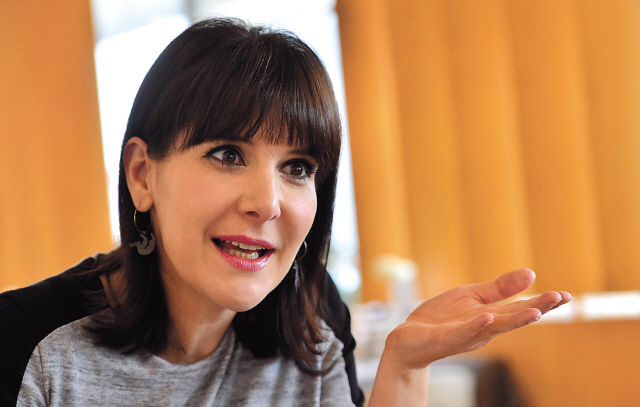This is the 14th in a series on foreigners working in Korean entertainment. ― Ed.
For most homes in Korea, Ida Daussy is a household name. She came to Korea 22 years ago and has spent much of that time on TV as well as lecturing and working in the business field. The country has watched her two sons, now almost 16 and 10, grow up.
And the French-Korean woman said she’s just as busy now as she’s ever been, currently balancing her position as a professor at Sookmyung Women’s University, working with two businesses, a seat on the board of the French Korean Chamber of Commerce and Industry, occasional TV appearances and lectures, and raising her sons.
“I’ve always worked a lot. And enjoyed it. I like to work, but also thanks to all this work, learning so many things,” she said in an interview with The Korea Herald on Feb. 18.
She has been introducing French companies to Korea and vice versa, which takes a lot of time, since it has to be accurate and easy to understand, thus requiring a lot of research and study. She says it’s fascinating to learn more about a subject that one likes or even loves.
Building bridges
And she said she appreciates the work, considering about two and half years ago, she saw it trickle down almost to nothing. At the time, she was going through a very public divorce. She saw all her TV work start to disappear.
“It was a huge tsunami in my professional life,” she said. “So, then I knew what it feels when you see your life in danger and everything seems to be stopped. Never that again. So I’m happy to work a lot.”
And work she does.
Once or twice a year she organizes events between Korea and France. This summer, she put together a huge seminar for Schneider Electric Korea. They brought in apnea divers from France and went to the Yeosu Expo. She said they held conferences and went diving with the haenyeo in Jeju. She said it was a great success and she hoped to be more involved with such events in the future.
In fact, she is already working on another big project with the French Culture Center for this June. She said she can’t go into details yet, but has high hopes.
She is also kept busy with her work as a professor. She teaches French, but through many different scopes, such as business and media ― something different than when she worked at Yonsei University upon first arriving in Korea.
“When I was working for Yonsei, it was much more conversation for beginners and literature,” she said.
But now her classes are more centered around the business world. And with more and more French companies coming to Korea, from large all the way down to small and medium-sized companies, it’s important to have French-speaking people in Korea.
“I think it’s a good thing. And you know I’m also very proud to be part of that. It’s a lot of work,” she said. “To be part of a university that’s so dynamic, as I said before, they are really pushing their students to be closer to the business field. And they want them to be more dynamic and not waiting on their seats in the university.”
And apparently her students like it as well. In recent student evaluations, she received 4.5 points out of 4. She didn’t know about the evaluations at first and was worried since she didn’t go out with her students like other professors.
But whatever she’s doing, they seem to like it and she’s preparing for the next semester, which will be the first of the new school year.
Despite all the work, she said she still finds time to be with her family. They live in the French Village and she says it’s much easier now that her sons are older and no longer need baby-sitters.
“I know I’m working a lot, but when I’m not working, I’m with them 200 percent. So that’s the thing, that’s the deal. They have their life, I have my life, they know I’m working for us and also for me as a women, I need that, and when we’re together, I’m their mom and do enjoy to go out with them, and discover plenty of things together.”
She adds that growing up on TV in front of the Korean audience doesn’t seem to have affected them too much. She admits it’s not their career or thing, and she only allowed them to appear for special occasions since she didn’t want them missing school. But Koreans always seemed to be interested in her family since at the time, there were not so many international families in Korea.
“People were eager to know how it would be for us, because you know, not so very long time ago, international families were a strange thing to see in Korea. They were not so much accepted,” she said.
Multicultural asset
“So, well, living an international experience in my family and having two Korean-French kids, well people were eager to know how it went and how we would deal with it. And, I think they really love the kids.”
She said they watched her sons take their first steps and learn Korean. Now, her oldest can speak four languages and she said he enjoyed switching from one to another. She said it was a “huge treasure” for Korea to have so many international children who were multilingual.
“I hope Korea will realize that all these kids are not a second-range Korean people,” she said. “It’s a huge treasure, and they have to take care of them. And look at them as Korean kids. Even sometimes, some of these kids have a little darker skin, it shouldn’t make any difference.”
By Emma Kalka (
ekalka@heraldcorp.com)








